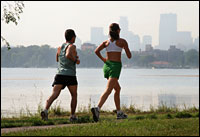Dear Umbra,
I am a runner, and in the summertime it is difficult for me to run during the day because of the heat. Unfortunately, it’s a no-no for me to run in green spaces late at night because they are dark, deserted, and thus quite unsafe. So this leaves me the option of running in busy areas of the city after the sun has gone down. At these hours, the traffic is usually light, which makes for a more pleasant run — but I’m wondering about air quality. Do car exhaust and other pollutants stick around close to the ground even when traffic has dissipated, or do they move up into the atmosphere? Should I just be running in the park with a bodyguard?
Sara
Ottawa, Ontario
Dearest Sara,
What a time we live in, when our two best choices are inhaling toxic air or braving the dangers of a public park. Your letter makes me want to curl up in a ball for the next several days, until the urge for mango sorbet propels me from the couch. But they don’t pay me to curl up in a ball — so, like you, I shall soldier on.

The jog days of summer.
Photo: iStockphoto
You ask whether exhaust and other pollutants stay close to the ground or ascend to some higher place. The short answer is: yes. It all depends on weather, geography, traffic intensity, the type of pollution, and so on. Some particulate matter can stick around for weeks, but in general pollution weakens with time. Since traffic is lighter in your area at night, and factories are likely spewing less, your idea that nighttime air is cleaner than daytime air is roughly right. One of the worst foes you’ll encounter, ozone, is created when the chemicals in car exhaust and other emissions react to sunlight. It lurks mostly during the day, usually hitting its peak in the late afternoon and early evening, and lessens quickly as the sun goes down.
Probably the best advice I can give you is to check local air-quality forecasts — color-coded for your convenience! — and keep a close eye on your body’s reactions as you run. As I write this, for instance, I see that the air quality in Ottawa is green, for good. A nice night for running. Those of you in other provinces and in the U.S. can check your local pollution levels too.
Try not to run on days or nights when the air quality is especially bad. (This will help you escape the fate of one Grist staffer who, in her previous life in D.C., was stopped while running by a Post reporter doing a piece on “crazy people who run when the air quality stinks.”) Pay attention to the local forecast, especially if you have asthma or another respiratory condition. If you simply can’t miss a day, ease up a bit: walk instead of jog, jog instead of sprint. Or whatever it is that you people do.
Let’s think about whether there are alternatives to your nighttime runs. You could round up friends to run in the park — safety in numbers. You could join a gym or create one with your friends by combining your collective equipment. I suppose there’s running in place at home, though that sounds about as much fun as counting quills on a porcupine. Looking toward the longer-term, consider lobbying your government to endorse less-polluting cars and public transportation. After all, you’re in the capital of your fair country. The pulsing heart of democracy and decisiveness. Run on over to Parliament Hill — and tell them I sent you.
Pantingly,
Umbra


